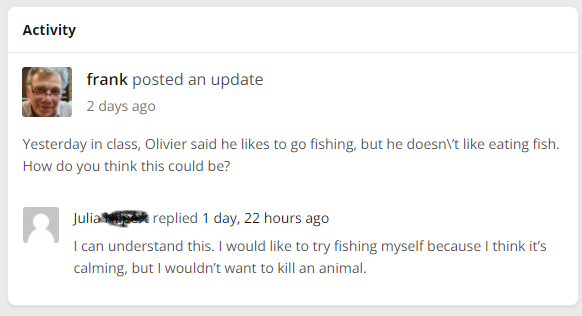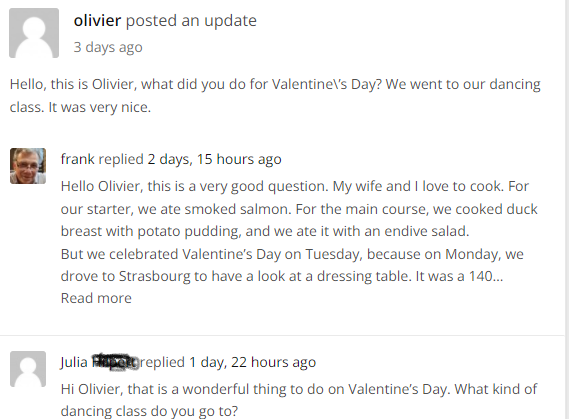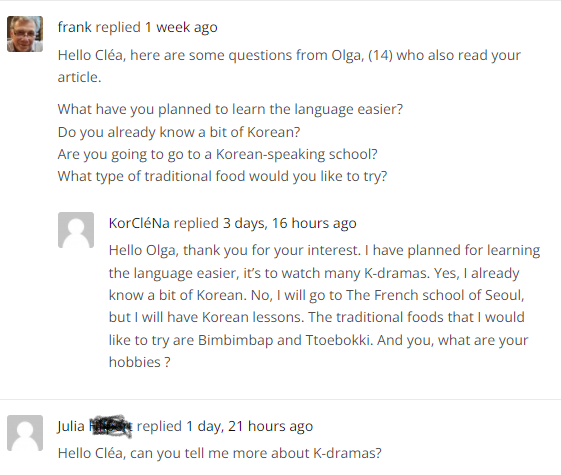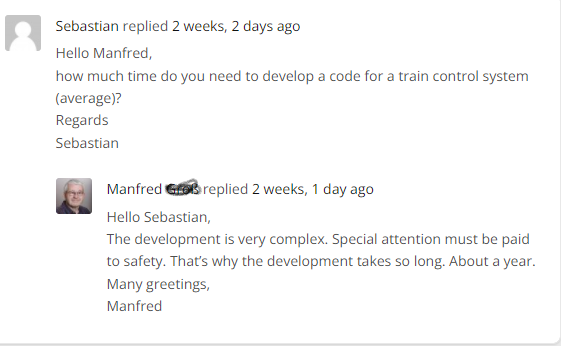Welcome to Our Brida.
On Friday, Julia (who lives in Mannheim) asked if giving a present is more satisfying than receiving a present.
The day before, Olivier (who works in Hatten, in the Alsace) said that he likes fishing but doesn’t eat fish. Whereupon Julia replied, she can understand that. It is about relaxing, but not killing animals. But Julia could be interested in fishing. This will give Olivier something to talk about.
Sebastian (who lives near Baden Baden) started a discussion in the holidaymakers’ group and described the type of holidays he and his wife prefer. Manfred and Martin (who both work near Kassel) answered Julia’s request for holiday ideas. They even offered to book it for her.
Monica in Dublin described the wedding dress she had made for her anniversary and gave long answers to the questions Walter, Sebastian and Julia asked. Monica got some feedback that goes beyond clicking a “like” button. (Which doesn’t exist in Our Brida).
Cléa’s (who lives in Hunspach, in the Alsace) article, describing her move to Seoul in the summer, has prompted quite a few comments and questions. Her mother described a visit to the European Parliament and her father, who is currently posted in the Central African Republic, said that the only reliable weather forecast comes from the United Nations. People don’t really need a weather forecast there. They have other things to think about.
Walter, Didier and Martin are slowly beginning to talk about classic cars. Walter lives in Nördlingen (Bavaria), Didier in Hatten and Martin in Kassel, (northern Hessen).
And, so it goes on.




Our Brida, is a new addition to the Brida Project. It’s been in development for a very long time because it needed the right tools for it to be effective, and I didn’t want to put it on any public social media platforms. It is managed conversations amongst the Brida community. It is integrated into my own website and is therefore free of any problems associated with other platforms. And, as such, I can combine The Brida Journal, special interest groups, the courses in the Brida Library and my classes, all under one roof. You can use it in a training room or online.
What do you do? As a participant, you ask a question, choose, find or react to a topic, that you wish to share with other people in the Brida Community. Then it gets posted and passed around. The result is that people communicate with each other and less with me. This is the fine line that this programme offers. My role changes. I provide the opportunities and help in the formulation of questions or answers, but it is the community that does all the talking, reading and writing. It is the community that determines what people talk about. This is important because it is not the teacher who sets the agenda, it is the community.
Do you want to learn English, or learn to communicate with people IN English? That is the central question. Those who take part find it has changed the dynamics. Stories are exchanged, ideas shared. It is an experience. It is also learning about something, IN English. It simulates reality. Beginners communicate with people who are proficient and vice versa. It works because we focus on the topic and not the language skills.
For 28 years, people have told me “I want to learn English.” It made sense in companies because English is widely used. But for many, it is a more theoretical task. Perhaps, one day, in the far distant future, I might need it.
Only, by then, you will have forgotten it.
Our Brida has one goal. It should be fascinating enough to make people want to read the conversation regularly. Then, it should motivate them to contribute to the discussion. It is pure learning by doing. It is also challenging.
“Should I write it?” asked Sebastian at one stage. “Why not?”, I answered.
“Is it interesting?”
“Make it interesting!”
Walter, his colleague, spent some time formulating, in German, what he wanted to contribute because it had to be right.
Nathalie started a discussion thread about her visit to the European Parliament. However, what she thought, then discussed with me and finally wrote were all quite different.
The spirit of Brida is that the project is for learners of English, by learners of English. It became very clear, how effective this can be when I had my lesson with Julia last week.
Julia had not read Cléa’s article, but together, we read the discussion thread about it. Julia was quite fascinated by the thought of Cléa and her family moving from a village of 1000 inhabitants to a city of 18 million. And she wanted to ask her a question about K-Dramas.
“So, Cléa is improving her English with me.” I said. “How can you formulate the question in such a manner, that you get your answer and Cléa has to provide you with a maximum of information, in English?”
Even Julia, who is proficient in English, was stuck. We worked on the formulation together. And on Wednesday, Cléa will be confronted with the question. If she reads the question before class, she will know what is coming. Whatever, she will think, speak and then write about K-Drama.
Both will be happy. Cléa will communicate with Julia, in English. Both will improve their English. Cléa should be happy because somebody is interested in her topic, and Julia should be happy because she will expand her horizon just that bit more. And a teenager, “teaches” somebody twice her age.
This is what Our Brida is about.
To join, you must register. Our Brida is in beta mode until the summer, after which it will be placed behind a paywall and be fully integrated into the Brida Project.